Interview with John Page–A guitarist and guitar maker

I have been designing and building guitars since the mid 1970’s. Many of those years, 21 in fact, at Fender Guitars… the first 9 as a Guitar Designer in Research and Development and the last 12 as the co-founder and head of the Fender Custom Shop. During those years I worked with some incredible people and created guitars for some great artists. Artists like Eric Clapton, David Gilmour, Pete Townshend, Elliot Easton and Cesar Rosas, just to name a few. I was also fortunate to design guitars in conjunction with some of the world’s most well known iconic companies like Harley Davidson, Playboy Magazine and Jaguar Automobiles. I designed, built and led with the passion of an artist. Having to combine business with art is a tough gig, and I bucked the system a lot. It wore me out. After almost a quarter of a century I lost the passion for guitars.
I left Fender in November of 1998 to pursue another passion, although tied to the first to some degree in spirit. I became the founding Executive Director of the Fender Museum of Music and the Arts. I spent the next four and a half years creating a 33,000 foot Museum, Education, Performance and Recording facility in Corona California for kids. It was a gas! It allowed me to pour all of my energy into a “feel good/do good” project…free music education for kids. After the Center was built and the programs developed it was time for me to move on again.
In January of 2003 I moved up to my land in the Southern Oregon forest to build a new life and home. The first year I built my shop. The next several years I concentrated on my non-guitar related art… functional art furniture. I’m not sure where my interest in art furniture came from, but I’m pretty sure it stemmed from the same core as my guitar building desire… I didn’t have the finances to buy the quality I wanted, so why not build it. And if I’m going to build it, why not make it really unique and cool? I was always challenged and intrigued by how to take a necessary function and create a utensil to achieve that function in a unique and beautiful way. I loved it! Unfortunately I never seemed to get around to building my own furniture. Everything I built usually was sold… pretty much just like the guitars. Funny how life works, eh?
Soon, my fiery passion for guitars, which a few years earlier had burned out, started to smolder again. In mid 2006 I sat down at my drawing table and designed a new guitar… the P-1. It was a combination of all the things I had wanted to do in prior years but hadn’t gotten to, and since it was “my” guitar, I could design it my way, not Fender’s or any other companies way. That day John Page Guitars was born. Since then I have designed three more guitar models and a bass… oh, and I figured why not throw my art smack dab in the middle of the guitars too. So I have created, and am still creating, some very unique art guitars. Some by myself, and some in collaboration with some good artist friends… Pamelina Hovnatanian, John “CRASH” Matos, and Vince Carl.
I’m back… the passion is back… the guitars are back! I build a very low number of guitars per year, by hand, by myself, the way I think they should be built. I put an enormous amount of time into each instrument and give it all the time it needs in between each operation to be built the way I think it should be. I have always tried to let my art lead me in the direction I should go… I can always trust the art.
We had an email interview with John.
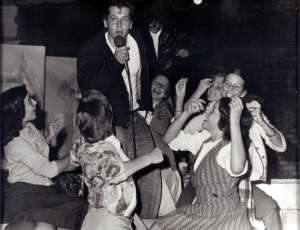 Q1. Tell us about your childhood and how you got attracted to music?
Q1. Tell us about your childhood and how you got attracted to music?
I grew up in the late 50’s/early 60’s in a Los Angeles suburb, the son of a preacher. “Rock ‘n Roll was considered devil music, so of course I was drawn to it! My first music memories are Elvis Presley, and of course the Beatles when they first came to the US. I think the fact that I was raised in such a religiously controlled home made me want to express myself somehow. Writing and playing music allowed me the venting I needed to express my emotions. A lot of my mother’s family was also into music, although I never was able to witness their work first hand. My grandfather was a pipe organ builder, my uncle had his own “big band” radio show, and my mom was a light opera singer.
Q2. How it came that you picked up guitar—though you ventured into making guitars but how you liked it in the first place?
My dad had a cheap guitar that he had bought in Tijuana Mexico when I was a kid. He let me have it when I was pretty young. It was a terrible piece that made my fingers bleed, but it was my first guitar at least. It was the main guitar I wrote on until I was probably around 18.
Q3. Tell us about your education, tutelage and any training that you got for guitar making.
I didn’t receive any tutelage in guitar making, or virtually any woodworking for that matter, except for a half of a semester of wood shop in Middle School. My guitar building stemmed from a need for better instruments than I could afford to buy. My buddies and I put a band together when we were about 14 and we didn’t have any money to buy good equipment. So I went a got a job as a night time janitor in the oil fields near where I grew up. With the money I earned I was able to buy some drums for my drummer, a couple of small amps, a Vox guitar. But everything was pretty crappy and I ended up modifying the guitars and amps to make them better. One thing led to another.
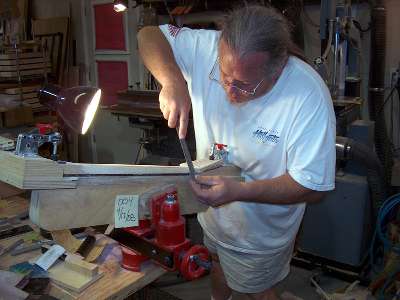 Q4. How difficult was it to emotionally restrict your interest in playing guitar to making guitar? Did you continue playing guitar when you actually started the manufacturing job?
Q4. How difficult was it to emotionally restrict your interest in playing guitar to making guitar? Did you continue playing guitar when you actually started the manufacturing job?
I think I primarily started playing guitar to write with it. It wasn’t that the act of playing the guitar was that important, it was the act of writing with it that was important… the act of creating. I played in bands through most of my youth, including the first 9 years at Fender. I didn’t quit playing out until I started the Custom Shop. The venture took so much of my time and creative energy that there wasn’t much left for anything else at first.
Q5. Was there any social pressure also to do something else rather than try it—I mean how did you equip yourself to take up the job of a guitar maker?
I never thought of “how to equip myself to be a guitar builder” I just did it. My dad used to always tell me that a job was a means to an end, I never accepted that. I just always followed my gut, and my gut really enjoyed building guitars. I happened to be really lucky to grow up near the Fender factory and also to be a very persistent young guy. I started applying at Fender at the age of 16. They finally hired me on my 21st birthday.
Q6. How you got selected in Fenders, and how was the experience in the beginning?
I had a bunch of lame jobs as a young guy, Shift Manager at a fast food place, a vending machine repairman, and an assistant warehouse manager. I really hated these jobs, but I was building my musical equipment on the side. One day, just before my 21st birthday I had to fill an order for Fender at my warehouse job. It reminded me that I hadn’t applied there for a while, so I took my birthday off and went down and applied. While I was filling out the application I said hello to some guy that happened to be there. Turned out he was the factory foreman. I handed in my application and left. As I was driving out of the parking lot this guy came running out after me and asked if we could talk. Anyway, I told him that I would be willing to take any job they had as long as I could advance. He hired me on the spot, and I started 2 weeks later as a factory neck buffer.
I had never worked in a factory before, and on my first day of work I thought that I had really screwed up. I hate the factory “mentality” of numbers, numbers, numbers… quantity was the most important thing. It sucked. I applied for every opening that they had within the first 2 months I was there. Finally a job came up that was for a Model Maker in Research and Development. I applied for it and it was right up my alley… building guitars, amps, electronics, drums, keyboards, you name it. Whatever the engineers designed it would be my job to make it. I got the job! It was the start of an amazing life for me as a designer/builder at Fender. Within 2 years I was promoted to a Guitar Designer and worked side by side with Fender legend Freddie Tavares… what a ride!
Q7. Tell us about the Custom Shop at Fenders.
Throughout my years in R&D we made special instruments for artists, guitars, drum, Rhodes pianos, basically whatever an artist was looking for to help us develop new product. So many of us knew there was a place for a custom shop, but we couldn’t convince CBS management that it was a good idea at the time. I ended up taking an 11 month hiatus from Fender in 1986 to work full time on my music. Near the end of that year, under new private ownership, Fender finally decided to start the Custom Shop. I decided near the end of that year, to go back to Fender, since I wasn’t able to place my songs as I had hoped. When I contacted them they told me they were going to start the CS and offered me either to go back to Guitar R&D or start the CS with a guy named Mike Stevens that they were going to hire out of Austin Texas. I decided to go for the CS gig.
It was supposed to be just the two of us building a few cool guitars a month to help lift the stigma of the CBS years off of Fender. But the idea became so popular that we got swamped with orders pretty soon after starting. One thing led to another and soon I had to amass a sizable work force to be able to handle the demand. There are too many stories to try to cover it all, but the main concept was to hand build the absolute best Fenders we could to any specification that a customer could imagine… or that we could imagine. We created some very cool pieces over the years, and built for most of the top players in the world.
Q8. The variety of guitars around the world is sometimes mind-boggling. What kind of guitars you liked to manufacture most and why?
I grew up with the Fender sound and the whole Surf thing, so that has always been my favorite. Since it influenced me at such an early age, and I worked there as a designer and builder for 21 years, it still influences my designs, although they have matured beyond the traditional Fender.
Q9. Tell us what are the most important aspects of a good guitar for user?
There are many aspects that make a guitar “good”. I always try to make each of my guitars “great”. It starts with the wood selection. Picking the right wood species and the correct specific piece to create the tone you’re looking for. Then you need to process the wood correctly. Give it the time it needs to settle in as you shape it. I think this is one of the main areas that large manufacturers make mistakes. They are producing on such a large scale that they cannot take the time necessary to allow the wood to do what it needs to do. I’ll try to explain – each piece of wood had internal stresses built up in it, both from the growing process and the drying process. Every time you remove a section of that wood you remove some stresses… the wood moves. Sometimes it takes an extended period of time to allow the wood to move all it wants to. Then you remove a bit more… and it moves again. To make a stable instrument you need to remove the wood in the proper sequence and give it the appropriate time it needs to stabilize.
If you approach the building of the guitar with the above in mind, then the other critical aspects are the overall tone it produces, the playability, the aesthetics and the balance. All of these need to be taken into account while creating the instrument. I strive to create guitars that the player can bond with, that he or she can feel vibrate through their soul when they’re playing it. Some people don’t think that’s possible with an electric guitar. I do not agree.
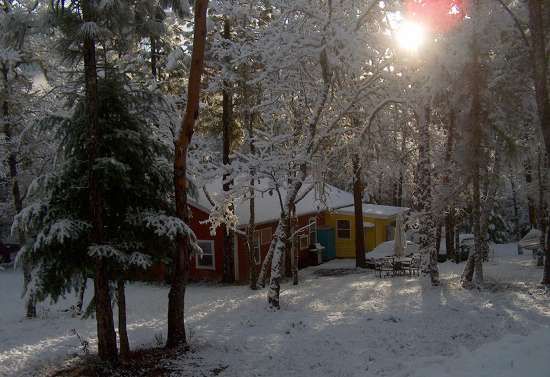
Q10. What about electronic guitars—do you feel technology has taken away the sheen of artist’s touch?
I think “some” electric guitars have taken something away from the art of building. I think from a building point of view some of the artistry and craftsmanship has been lost due to the whole mass production thing. Building guitars that create tones without depth, just volume. From a players point of view I think the electric guitar is just another color to paint with. I don’t think it’s taken away the sheen of the artist’s touch at all, just expanded it.
Q11. In a manufacturing unit like that of Fenders, what time does it take to make one guitar?
When I was there, the actual time it took for the factory to make a standard model was only about 5 man hours. This process usually happened over the course of about 2-3 weeks. Custom Shop guitars took many more hours, some up to hundreds of hours, depending on the complexity.
Q12. Tell us about your family—is any member with you as a manufacturer?
No one in my family currently works with me in the business, although my wife, Dana, has been my inspiration and muse for almost 25 years. My son, Adam, worked with me for a while at Fender, and went on to work at Rickenbacker and Suhr. He decided to get out of the guitar business several years back and now has a successful web design business. I have two daughters, Ashley and Monique, and three grandchildren, Kole, Mason and Gwen. Hopefully one of these days one or more of my family will decide to join me in the business. Nothing would make me happier!
Q13. How satisfying it has been to produce the instrument rather than music?
I quit writing my music because I chose to… so I don’t miss it. It’s not like it was taken away from me. And I love performing, but I did it for 16+ years, so I go my fill. The satisfaction of my building is the fact that I am building an instrument that helps someone else create, and that maybe that instrument will last generations. That’s pretty damn satisfying.
Q14. Given a choice of playing guitar or manufacturing it, which one you will choose?
I don’t like the use of the word “manufacturing” because to me it represents a factory type of building. So if I could reword the question to be a choice between building and playing, I would choose building. As I have said before, playing guitar for me was to allow me to write, to create. Building is creating. It’s the creating that is important to me. Taking an emotion or a vision and making it a reality, either physically or audibly… that’s the magic… that’s my passion.
Q15. What else you like to do in your spare time?
Good question. I don’t really think of myself as ever having any spare time. I guess when I do my number one priority if to spend time with my family. Then I have 7+ acres of land that I live on, so I’m always working on it. Basically my life revolves around my work.
Q16. A message to our readers?
I guess my message would be that life is like being an explorer on the open sea. You start off in a direction that you think a new world will be… and sometimes it is… but most times it isn’t. So you have to allow yourself to change course to find your own paradise. It’s not easy, it takes lots of hard work, but find your passion and follow it. If you do, you will live a blessed life.

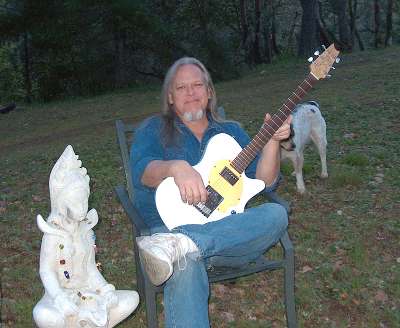
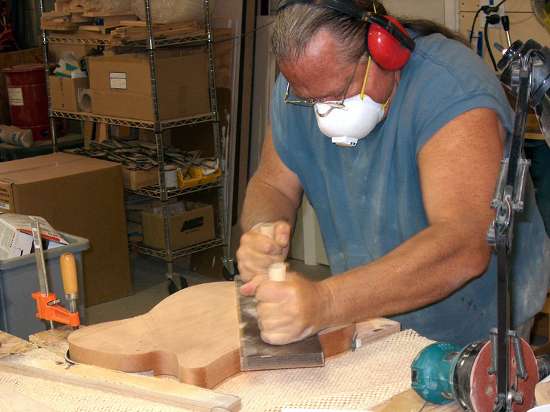
 Album Review—Inner Sanctum
Album Review—Inner Sanctum  Album review—Back To My Roots
Album review—Back To My Roots  Album Review—Days of Gypsy Nights
Album Review—Days of Gypsy Nights  Album Review—Open by Stephen Wallack
Album Review—Open by Stephen Wallack